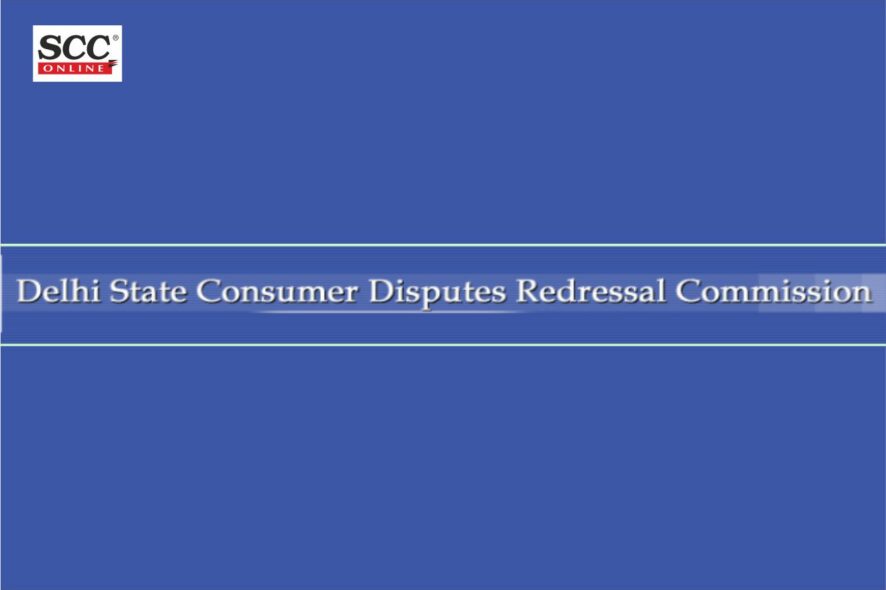Delhi State Consumer Disputes Redressal Commission (DSCDRC): Coram of Dr Justice Sangita Dhingra Sehgal (President) and Anil Srivastava (Member)ordered the builder to refund the money deposited by the complainant, as a consequence of not being able to deliver the possession of flat on time. However, it was held that the builder was not liable to refund the EMI amount paid by the complainant towards loan sanctioned in favour of the complainant.
Present consumer complaint was filed under Section 17 of the Consumer Protection Act, 1986 against OP 1 and OP 2.
Complainant had applied for booking of a flat in the OP 1’s project and was allotted a flat for the total sale consideration which was agreed at Rs 44,99,387.
Complainant and OP 1 entered into a Flat Buyers Agreement. It was stated in the agreement that the possession of the flat was to be delivered within 18 months from execution of the agreement along with a grace period of 6 months. Though, OP 1 failed to adhere to the stipulated time for delivery of possession and hence the complainant had to withdraw from the project.
Further, OP 1 informed the complainant regarding the deduction. Adding to this, it was submitted that the service tax paid on the entire transaction would also be forfeited.
Complainant got served a legal notice dated 03-10-2015, upon the OP 1 and sought refund of the amount deducted along with compensation for mental agony and harassment.
Alleging deficiency of service and unfair trade practice on the part of OP 1, the complainant approached this commission.
Analysis, Law and Decision
Territorial and Pecuniary Jurisdiction
Whether this commission has the jurisdiction to adjudicate the present complaint?
Coram on perusal of Section 17 of the Consumer Protection Act lead the Commission to the conclusion that it shall have the pecuniary jurisdiction in cases where the total claim including the compensation is more than twenty lakhs and less than One Crore. Moreover, clause 17(2) of the Act provides the extent of territorial jurisdiction, wherein it has been provided that the state commission shall have the jurisdiction to entertain cases where OP 1 at the time of the institution of the complaint, actually and voluntarily resides or carries on business or has a branch office or personally works for gain or the cause of action arose.
Hence, the commission has pecuniary jurisdiction in the present matter.
To strengthen the above finding, Coram relied on the Rohit Srivastava v. Paramount Villas (P) Ltd., 2017 SCC OnLine NCDRC 1198.
Further, the Coram stated that relying on the above case, this Commission has both territorial and pecuniary jurisdiction.
Deficiency of Service
The stated expression of Deficiency of Service was dealt with by the Supreme Court in Arifur Rahman Khan v. DLF Southern Homes (P) Ltd., (2020) 16 SCC 512.
In Commission’s opinion, OP 1 was deficient in providing its services to the complainant since it had failed to handover the possession of the flat within the stipulated time period and the complainant was entitled to the refund of the money deposited to OP1.
OP 1’s deduction was not justified as the complainant had sought cancellation of the booking of the flat on account of deficient services provided by OP 1, hence the complainant was entitled to refund of the amount forfeited.
However, the Complainant was not entitled to receive an amount of Rs 6,33,289/- since this amount was paid as EMIs towards the loan sanctioned in favour of the Complainant. The OP 1 has no obligation to pay the EMI amount, since there exists no express agreement pertaining to the payment of EMIs to be done by the OP 1. [Kapila Narula v. Logix City Developers (P) Ltd., Complaint No. 149 of 2016, decided on 16-08-2021]
Advocates before the Court:
Ms. Suchita Sharma, Counsel for the Complainant.
Ms. Arushi Pathak, Counsel for the Opposite Party.







